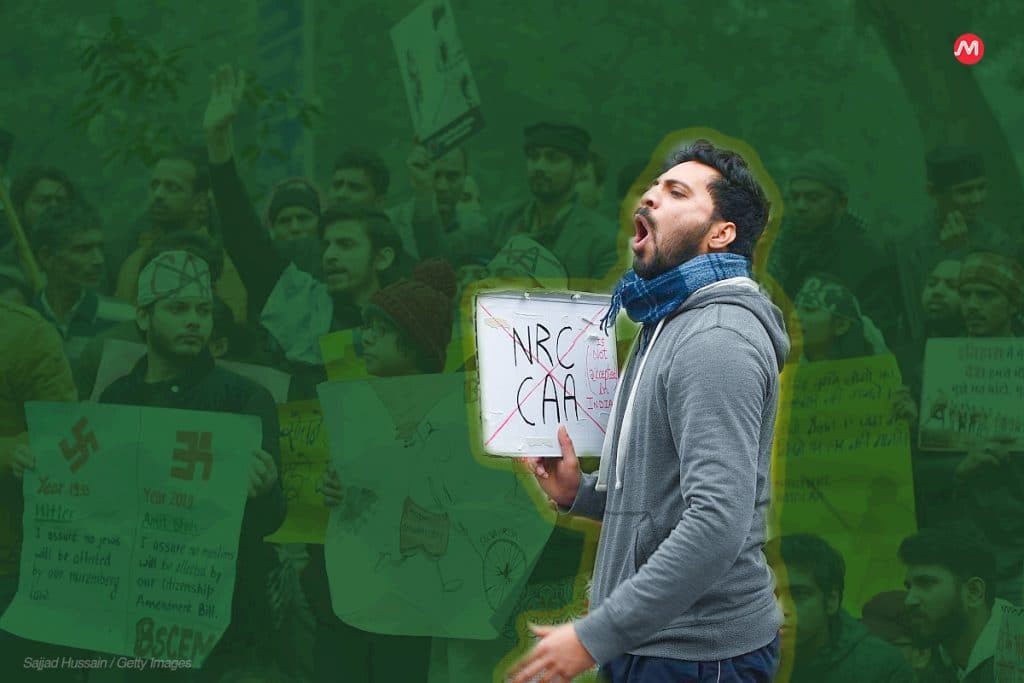
“My son protested against the unjust Citizenship Amendment Act, this is why he has been imprisoned,” says Shamshad Ahmad, father jailed activist Shadab Ahmad, while at work at the small bakery in his house.
70-year-old Shamshad has become the sole bread earner in the family after Shadab’s arrest in 2020 Delhi ‘riot conspiracy case’. He was arrested on 06 April last year under First Investigation Report 60/20 — related to killing of Head Constable Ratan Lal.
However, in May he was named in FIR 59/20 under stringent terror law — Unlawful Activities Prevention Act. He is accused as a ‘conspirator’ of the anti-Muslim pogrom that killed at least 53 people, of which overwhelmingly Muslims.
FIR 59/20 has been at the receiving end of wide criticism for targetting Muslim activists and anti-CAA protesters. Human rights groups have argued the investigation has turned into a guise to stifle dissent.
The 27-year-old was working as a supervisor at a factory in Delhi’s Jagatpur area, when India witnessed nationwide anti-CAA protests.
Shadab would work in the mornings and go to the protest sites at night. “He would go everywhere — Jama Masjid, Chandbagh and other places too,” one of his colleagues told Maktoob.
“We miss him,” says Shamshad, refusing to complain about anything else. “I’m sure he is going through harder times than us.”
“Whatever has happened is part of God’s will and mercy. We have nothing to complain about,” he adds, acknowledging that ‘there are problems, but we try not to be worried.’
“Pareshan hoke karenge bhi kya batao — Tell me, what can be done by simply worrying?”
“We were planning to get him married,” recalls Shamshad. A reputed man recently approached Shamshad for his daughter’s hand in marriage with Shadab. “I told him my son is in jail. But the man said he knew about it and still wants to marry off his daughter to Shadab.”
The last time Shamshad spoke to Shadab was three months ago he went to meet him at Mandoli jail. “We exchanged few words of comfort and support,” he recalls.
Shadab’s confession statement to police
According to The Wire, Shadab, in a statement recorded on May 27, 2020, had allegedly told the police about two WhatsApp groups that planned to set up, among other things, roadblocks to give the protests an “offensive” character.
He mentioned a group named “DPSG”, spelt out as “Delhi Protest Solidarity Group” in the statement. He claimed that locals and outsiders allegedly made inflammatory speeches at the protest site and that he was in regular contact with the speakers through WhatsApp.
Aside from the DPSG, Ahmad mentions other WhatsApp groups such as “People Against Fascism”, “Save Constitution” and “Khidmat”.
However, a statement given by an accused in police custody has no evidentiary value in law as per legal experts.
The Delhi police are presently relying on testimonies like Shadab’s to prove that the anti-CAA rallies paved the way for the February violence. It plays into the police narrative that Muslims led the violence during the pogrom.
“All the accusations against him are false. It was part of the government’s plan to arrest all anti-CAA activists and protestors. It has nothing to do with any violent acts,” Shamshad told Maktoob.
Forced to sign documents in custody
Shadab alleges that, while in police custody from August 24 to 26 last year, he was forced to sign documents without being allowed to read the contents.
He disclosed this to his counsel during a legal meeting through video conferencing on September 2, who then filed an application seeking that any document produced with Shadab’s signature before the court be deemed as “forged and fabricated”.
However, the court rejected Shadab’s allegation. Additional Sessions Judge dismissed the application, saying Shadab had ‘physically met his counsel’ and also ‘telephonically talked to him’.
The judge said it was highly improbable that he would not disclose such a thing to his lawyer.
To this, Shadab’s counsel submitted that on August 25, he was allowed to talk to Ahmad for two minutes over the phone. The phone call was made by the police and handed over to Shadab, his lawyer said, reported TNIE. “it was highly unlikely that the accused would say anything over the phone with the call being facilitated by the police during custody.”
Shadab was to remain in police custody for one day more and was apprehensive about disclosing such information, his lawyer claimed. Adding that Shadab was in COVID-19 quarantine after being sent to judicial custody, he was able to meet him only on September 2, when he disclosed the alleged incident.
Many other anti-CAA activists including Sharjeel Imam, Umar Khalid, Khalid Saifi, Ishrat Jahan, Meeran Haider, Gulfisha Fatima, Shafa Ur Rehman, Tasleem Ahmed, Tahir Hussain Salim Malik, Saleem Khan and Athar Khan continue to remain in jail over similar charges.



